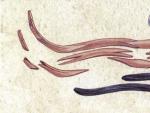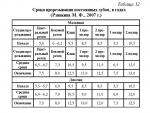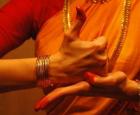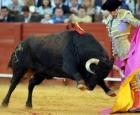What does the expression “It’s a dead hour” mean? Phraseologism "broken hour": meaning, origin, synonyms What does broken hour mean
The directory was compiled by the editors of the Gramota.ru portal based on materials from the following publications:
Birikh A.K., Mokienko V.M., Stepanova L.I. Russian phraseology. Historical and etymological dictionary / Ed. V. M. Mokienko. – 3rd ed., rev. and additional – M., 2005.
Dushenko K.V. Dictionary of modern quotations. – 4th ed., rev. and additional – M., 2006.
Dushenko K.V. Quotes from Russian literature. Directory. M., 2005.
Kochedykov L. G. A brief dictionary of foreign phraseological units. M., 1995.
Grandma said in two – it is unknown whether what is expected and counted on will come true. The expression is formed by truncation of a proverb Grandmother said in two: either it will rain or it will snow, either it will happen or it won’t.. It is also assumed that the expression and proverb are associated with fortune telling as a remnant of pagan beliefs. Grandmothers – healers, fortune tellers who predicted fate, weather, and spoke against illnesses or the evil eye. The proverb and phraseology reflect an ironic attitude towards fortune telling.
Indian summer – clear warm days in early autumn. There are several versions of the etymology of the combination. According to one of them, the expression is associated with that period in the life of peasants (the beginning of autumn), when field work ended and women began to do household chores: they soaked flax, ruffled it, and weaved it. According to another version, combinations Indian summer, Indian days, Indian cold in the old days had a meaning based on superstition: women have the power to return the seasons and generally influence the weather. Besides, Indian summer they call a thin, light web flying across fields and forests and foreshadowing a dry autumn. This web is associated with barely noticeable gray strands of hair in women, and the time of warm and fine days is associated with her age, which precedes old age and is characterized by relative flourishing.
Balzac age – about the woman’s age from 30 to 40 years. The expression arose under the influence of the works of O. Balzac, the heroines of which are women of that age. The phrase came into active use after the appearance of the writer’s novel “A Thirty-Year-Old Woman” (1842).
Ivory tower – symbol of the dream world; about the subject of dreams, divorced from life. The reverse belongs to the French poet and critic Sainte-Beuve (1804–1869) (a poetic message to Villemin, included in the collection “Thoughts of August”). The image goes back to the words of the Catholic prayer, in which this name is given to the Virgin Mary.
No fools (simple) - in all seriousness, no jokes. Sometimes the expression is referred to as “billiard” language. Some versions of the game of billiards required a certain number of balls to be placed in pockets. Balls that accidentally rolled into a pocket were jokingly called “fools.” Some players preferred not to count such balls and played “without fools.” However, the phrase is ancient: it was born during the Russian Middle Ages and is associated with the customs of the Moscow royal court. When noble boyars gathered in the royal chambers to “think the sovereign’s thoughts” and make serious decisions, their meetings were held in strict secrecy. No one was allowed there, especially witty and talkative “fools,” i.e., jesters who were customary to be kept at the royal court. Expression no fools literally meant “without buffoons”, and figuratively - “in all seriousness”.
Without hind legs (sleep) - very soundly, soundly. The expression arose from observations of animals: after work, the horse lies down and sleeps, completely relaxing its hind legs; if you try to lift her, she will stand on her front legs, and her hind legs will not obey her. Initially, the phrase meant “sleep without moving due to fatigue.”
No comments (no comments) – from English no comment. The turnover took hold soon after World War II. On February 12, 1946, after a meeting with G. Truman in the White House, W. Churchill told reporters: “No comment” - and explained that he borrowed this expression from Sumner Wells, an American diplomat. However, the expression “Without any comment” already existed in the 19th century, but not as a turn of political language.
Devoted without flattery (book irony) - about people flatteringly admiring an influential person. “Betrayed without flattery” is the coat of arms motto of A. A. Arakcheev (1769–1834), assigned to him by Paul I. This hypocritical characterization of the cruel general, known for his merciless military-police actions, was ridiculed by the progressive society of Russia. The epigram of A. S. Pushkin “On Arakcheev” (“The oppressor of all Russia ...”) contributed to the spread of a pun based on homonymy of words without And demon.
Without a king in my head (iron.) - about an eccentric, stupid, empty, imprudent person who does not know how to control himself. According to one version, the origin of the phraseological unit is associated with the proverb Everyone has their own king in their head, where the mind in the head is compared with the king in the state. According to another, the turnover arose as a result of the collapse of the proverb Your mind is the king in your head. In the 19th century they said about an intelligent person that he had a king in his head. Gradually, the negative form of phraseological units became more common and in modern language finally replaced the positive one.
White crow (usually disapproved) - a rare person, unusual in his qualities, an eccentric person who stands out sharply among other people. The expression is internationalism, a translation from the Latin alba avis, alba corvus. Goes back to the 7th satire of the Roman poet Juvenal: “Fate gives kingdoms to slaves, // delivers triumphs to captives. //However, such a lucky person is rarer than a black sheep.” Albino crows are a very rare natural phenomenon. Apparently, this circumstance allowed the Roman writer to use such a turn of phrase.
He ate too much henbane anyone(rudely simple) - lost his mind, behaves like crazy, crazy . Henbane- a poisonous herbaceous plant with a stupefying unpleasant odor. A person who eats henbane berries by mistake loses his mind for a while.
White flies - snow, snow flakes. The first snowfall is called white flies, when flakes of sticky snowflakes fly against the background of black earth and greenery that has not yet fallen and look like a huge swarm of white flies flying in one direction. In winter, this phrase is usually not remembered, but in spring, belated snowflakes against the background of the ground with melted snow are again indicated by this metaphor.
Stringless balalaika (disapproved) – a very talkative person, idle talker. Turnover of pun origin: balalaika"folk plucked musical instrument" and balalaika"balabolka" (simple).
Lost hour (disapproved) – a very long time. The phraseological unit arose after the appearance of the first striking clock. Word hour originally meant "time"; half an hour - this is the time from one stroke of the clock to the next.
Beat your head (disapproved) - to sit back, do trifling things, wander around idly. The most common version of the origin of this phraseological unit is considered to be the following. The expression is associated with the handicraft industry of making wooden spoons, cups and other utensils. Chocks split from a log, blanks for such utensils, were called in dialects thumbs up. Their production was considered by the people to be easy and did not require effort or skill.
THE HOUR IS STILL
a whole hour, a long time. The origin of the combination is purely Russian; it is associated with the appearance of the first striking clocks in the mid-15th century. The beaten hour is initially the time from one stroke of the clock to the next.
Handbook of phraseology. 2012
See also interpretations, synonyms, meanings of the word and what a BROKEN HOUR is in Russian in dictionaries, encyclopedias and reference books:
- THE HOUR IS STILL
cm. … - BROKEN in the Dictionary of Thieves' Slang:
- victim of a pocket... - HOUR
"BEAR" - a steady decline in the exchange rate value of the stock exchange... - HOUR in the Dictionary of Economic Terms:
"BULL" - a steady increase in the market value of the stock exchange... - HOUR in the Bible Dictionary:
- in the well-known sense, as 1/24 of a day, came into use only in the 4th century. according to RKh, although for the first time... - HOUR in the Bible Encyclopedia of Nikephoros:
(Dan 3:15, 4:16, Mark 15:25-34, Acts 2:15, 23:23, John 11:9). Measuring time using a sundial, namely the sun's shadow on... - HOUR
- HOUR
a non-system unit of time equal to 60 minutes or 3600 seconds. Designations: rus. h, int. h. 1 day 24 hours... - HOUR in the Encyclopedic Dictionary:
, hour (hour) and (with number) hour, hour, sentence. about an hour, in an hour and in an hour, pl. -s, -ov, ... - BROKEN in the Encyclopedic Dictionary:
, oh, oh. Shattered, broken. Broken eggs. Broken dishes. Broken glass. * Broken hour (colloquial disapproval) - a long time, a whole ... - HOUR
in Russia, an ancient travel measure equal to 5 ... - HOUR in the Big Russian Encyclopedic Dictionary:
a derived unit of time, designated h. 1 hour = 1 / 24 days = 60 min = 3600 s. 1 hour Wed. solar time is 1.02273791... - HOUR
cha"s, clocks", cha"sa, chaso"v, cha"su, chas"m, cha"s, clocks", cha"som, chas"mi, cha"se, ... - BROKEN in the Complete Accented Paradigm according to Zaliznyak:
bi"ty, bi"taya, bi"toe, bi"tye, bi"togo, bi"toy, bi"togo, bi"tykh, bi"toe, bi"toy, bi"togo, bi"tym, bi" ty, bi"tuyu, bi"toe, bi"tye, bi"togo, bi"tuyu, bi"toe, bi"tykh, ... - HOUR in the Dictionary of epithets:
About time, moment; about a period of life (usually something important, significant). Serene, gracious (obsolete), blessed (obsolete poet.), fleeting (obsolete poet.), fleeting... - HOUR in the Popular Explanatory Encyclopedic Dictionary of the Russian Language.
- HOUR in the Dictionary for solving and composing scanwords:
60 … - HOUR in the Thesaurus of Russian Business Vocabulary:
1. ‘moment of action’ Syn: time, time (raised), minute (raised), moment, moment (raised) 2. ‘a period of time intended for a specific activity’ ... - HOUR in the Russian Language Thesaurus:
1. ‘moment of action’ Syn: time, time (raised), minute (raised), moment, moment (raised) 2. … - HOUR in Abramov's Dictionary of Synonyms:
|| The hour has struck, the good hour has come, be patient for an hour, the last hour has struck, ... - HOUR
moment of action Syn: time, time (raised), minute (raised), moment, moment (raised) period of time intended for a specific activity Syn: time, ... - BROKEN in the Russian Synonyms dictionary:
crushed, pounded, battered, battered, beaten, broken, split, chopped, ... - HOUR
- BROKEN in the New Explanatory Dictionary of the Russian Language by Efremova:
1. m. One who, having experienced a lot in life, has acquired his own experience. 2. adj. 1) a) Broken into pieces; broken. b) ... - BROKEN in Lopatin's Dictionary of the Russian Language.
- HOUR in the Complete Spelling Dictionary of the Russian Language:
hour, -a and (with numbers 2, 3, 4) -a, sentence. in an hour and in an hour, pl. -s,... - BROKEN in the Complete Spelling Dictionary of the Russian Language.
- HOUR in the Spelling Dictionary:
hour, -a and (with numbers 2, 3, 4) -`a, preposition. at the hour and at the hour, plural. -`s,… - BROKEN in the Spelling Dictionary.
- HOUR
a period of time equal to 60 minutes, one twenty-fourth of a day. days, and by the hour (very quickly) A whole hour has passed. Late... - BROKEN in Ozhegov’s Dictionary of the Russian Language:
chopped, broken Broken eggs. Broken dishes. Broken... - HOUR in Dahl's Dictionary:
husband. time, times, hour, time; | leisure, freedom from business; | time, time, convenient time. The bad time has come. ... - HOUR in the Modern Explanatory Dictionary, TSB:
derived unit of time, denoted h, h. 1 hour = 1/24 day = 60 min = 3600 s. 1 hour average... - HOUR
hour (colloquial hour) and hour, about hour, in hour and in hour, plural. s, m. 1. hours (hours region). time, … - BROKEN in Ushakov’s Explanatory Dictionary of the Russian Language:
broken, broken; bit, bit, beat. Proverbs suffering past vr. from beat in 1, 2, 3 and 6 values. Beaten bird. ... - HOUR
m. 1) A period of time equal to sixty minutes, one twenty-fourth of a day. 2) A certain period of time allocated for a lesson, lecture... - BROKEN in Ephraim's Explanatory Dictionary:
beaten 1. m. One who, having experienced a lot in life, has acquired his own experience. 2. adj. 1) a) Broken into pieces; broken. ... - HOUR
m. 1. A period of time equal to sixty minutes, one twenty-fourth of a day. 2. A certain period of time allotted for a lesson, lecture... - BROKEN in the New Dictionary of the Russian Language by Efremova:
I m. One who, having experienced a lot in life, has acquired his own experience. II adj. 1. Chop into pieces; broken. Ott. Shredded... - HOUR
I m. 1. A term, a measure of time equal to sixty minutes, one twenty-fourth of a day, calculated from noon or midnight ... - BROKEN in the Large Modern Explanatory Dictionary of the Russian Language:
I m. One who, having experienced a lot in life, has acquired his own experience. II adj. 1. Beaten more than once. Ott. trans. ... - ORCHIDS in The Illustrated Encyclopedia of Flowers:
Growing methods There are two main methods of growing epiphytes: potting and block culture. It is advisable to grow individual representatives of terrestrial, deciduous plants in pots... - TURKISH PROVERBS in Wiki Quotebook:
Data: 2009-07-27 Time: 11:29:38 * Allah knows, but the slave also guesses. * Beware of everyone to whom you have done good. * Broken... - RUSSIAN PROVERBS in Wiki Quotation Book.
- MAXIM MOSCOW in the Orthodox Encyclopedia Tree:
Open Orthodox encyclopedia "TREE". Maxim of Moscow (+ 1434), holy fool for Christ's sake, blessed. Commemoration of August 13 (finding of relics), ... - HEALING NUTRITION MENU in the Book of Tasty and Healthy Food:
Daily menu of the diet prescribed for some forms of gastric ulcer, for gastritis with high acidity 8-9 hours. Scrambled eggs; porridge … - PHRASEOLOGISTS in the Dictionary of Literary Terms:
- (from the Greek phrasis - expression and logos - word) - phrases (expressions) that are stable in composition, the meaning of which is fundamentally indecipherable... - ROGOZHIN in the Literary Encyclopedia:
- the central character of F. M. Dostoevsky’s novel “The Idiot” (1867-1869). Parfyon R. is one of the most tragic figures in Russian literature. At first -... - KABAKOV MARK VLADIMIROVICH in the Big Encyclopedic Dictionary:
(b. 1924) Russian writer, publicist. Collections of poems: “Romantics” (1961), “Night Watch” (1972), “My Ships” (1984), etc. The story “Broken Ice” ... - CEMENT (INORGANIC BINDING MATERIALS) in the Great Soviet Encyclopedia, TSB:
(German Zement, from Latin caementum - crushed stone, broken stone), the collective name for artificial inorganic powdered binding materials, mainly hydraulic, with ... - CHARDIN, JEAN-BAPTISTE-SIMEON in the Encyclopedic Dictionary of Brockhaus and Euphron:
(Chardin, 1699-1779) - French painter, student of P.-J. Kaz and Noel Coipel. Helping the latter create accessories in his paintings, he acquired an extraordinary...
Philologist, candidate of philological sciences, poet, member of the Union of Writers of Russia.
Publication date:06/06/2019

Phraseologism "the hour is dead" It is used, as a rule, in moments of dissatisfaction and irritation.
Many foreigners will probably find this expression ambiguous and strange. Who is beating or who is being hit? Why is the hour running out? Even the Russian people will have doubts here!
Let's check whether we understand the meaning of the phrase correctly.
The meaning of phraseology
When people utter this phraseology, they usually mean that something has taken too long or the wait has turned out to be pointless. Another semantic connotation of the idiom: an ineffective action for which a lot of effort was spent.
“I waited for her for an hour, and she didn’t even call!” — a fan who has been “lured” by his beloved has the right to be indignant.
“I’ve been fiddling with the problem for an hour, but I can’t solve it!” - a slow-witted schoolboy might complain.
“We’ve been standing at the door for an hour, but there’s still no doctor!” — patients of the clinic rightly grumble.
All three of them have wasted a lot of time and are therefore disappointed. They mention this phraseology with indignation. After all, it’s still a decent part of life! In all cases, this phrase literally means: “very long and all in vain.”
Origin of phraseology
In Rus', time was measured by the sun. Only in the 15th century a clock appeared on the tower of the Moscow Kremlin. Despite the fact that craftsmen from among the people quickly learned the craft of watchmakers, they were set and wound by specialists specially recruited from England.
Every sixty minutes the chimes rang out, clearly audible in all parts of Moscow. Remember the song:
The clock is striking on the old tower,
Saying goodbye to yesterday...
Imagine a city where the loudest sound was the ringing of bells. You can’t hear any cars, no roar of turbines, no roar of the subway. And only the measured beats of the clock mechanism, spreading far in all directions, measure out another small segment of life.
The wait seems so long, silent and tiring... And suddenly: “Bom-mm!” The loud sound of the tower chimes seems to bring you out of your stupor, making you remember the passage of time.
It is curious that in Ancient Rome the movement of the arrow was also accompanied by a special sound. Slaves were forced to announce with a loud cry the arrival of a predetermined time.
I wonder what it was like to hear hysterical human voices announcing that the day has become shorter and night is approaching? It’s creepy... So our “beaten hour” is still flowers!
Synonymous expressions
On native soil, each of the interpretations of this phraseological unit has many synonyms.
The following phrases are used to mean “long”:
- a month of Sundays;
- around the clock;
- forever.
If something happens too slowly, they say:
- at a snail's pace;
- do not hit someone who is lying down;
- pull the cat by the tail.
When the result will not be achieved soon (and perhaps will never be achieved) they will say:
- after the rain on Thursday;
- to the Greek calendars;
- until the second coming.
And about someone who did the job but did not achieve the goal, it is permissible to say:
- fight like a fish on ice.
The British have a funny idiom “donkey ears”, which they say when they want to emphasize that some event has been going on for a very long time, and the wait is as long as a donkey’s ear.
Surely many have heard the expression “beat the hour”. It is very popular among both the adult generation and young people. The expression “beaten hour” is synonymous with a very long period of time. Initially, the word “hour” was used to mean “time”. The expression “beaten hour” usually expresses annoyance.
Origin and meaning
The phraseological unit “beaten hour” is associated with a striking clock. Historians believe that the first tower clocks were brought to Russia in the 15th century. They were installed in the Moscow Kremlin. Initially, it carried a direct meaning. The phraseology “beaten hour” appeared much later. We found out that the meaning of the phraseological unit “beaten hour” is directly related to its origin.
Phraseologism is a unique means of the Russian language. This instrument serves to decorate speech and enrich it. Phraseologisms, maintaining their form after so many years and even centuries, reflect the history, culture and way of life of the Russian people. Let's consider the stable expression “beaten hour” and study its history. A teaspoon per hour” - this stable expression appeared thanks to medicine. There is no need to explain the origin, because there is imagery.
Phraseologism is a unique means of the Russian language. This instrument serves to decorate speech and enrich it.
Phraseologisms, maintaining their form after so many years and even centuries, reflect the history, culture and way of life of the Russian people. In linguistics they are called realia.
Let's consider the stable expression "beaten hour" and study its history.
Origin and meaning
The phraseological unit “beaten hour” is associated with a striking clock. Historians believe that the first tower clocks were brought to Russia in the 15th century. They were installed in the Moscow Kremlin.
Despite the fact that in those days there were already watch production workshops in Russia, they were still purchased from the West. Even the installation of the Kremlin ones was carried out by invited English specialists.
The tower clock struck every 60 minutes, hence the phraseology. Initially, it carried a direct meaning. The phraseological unit “beaten hour” appeared much later. It was based on a metaphor. The feeling of waiting for the end of a long period of time transferred to other events, so the phrase became a catchphrase.
So, the meaning of the phraseological unit “beaten hour” is long, tedious and fruitless. This is what they say when they spend a lot of time on something and cannot complete it. In this case, precious minutes of life are wasted.
We found out that the meaning of the phraseological unit “beaten hour” is directly related to its origin. Unfortunately, over time, the stable expression has lost its imagery, like many other “pull the gimp”, etc.).
This happens because the language develops, some words become outdated and disappear from everyday use. However, we can find the meaning of such phrases in phraseological dictionaries. Particularly interested linguists themselves conduct research using etymological reference books, historical documents, and offer new variants of origin.
Synonyms
We have compiled a list of related expressions. It will help you correlate phraseological units with the meaning of “beaten hour”.

- “A teaspoon per hour” - this stable expression appeared thanks to medicine. Doctors wrote in the recipes: “drink “...” in an hour, a teaspoon.” And the patient was forced to wait so long between each appointment to be cured.
- "Pull the gimp." Previously, this word had a direct meaning - the production of metal fishing line. The task was painstaking and tedious, which is where the significance comes from.
- "At a snail's pace." There is no need to explain the origin, because there is imagery.
Examples from literature
Let's look at excerpts from literary and journalistic texts:
- "I've been trying to get silence for an hour, but you didn't shut your mouth!!! ... industry petrochemical complex?!"

This is a fragment from A. Ivanov’s book “The Geographer Drank His Globe Away.” The difficult life of a teacher and family problems force the hero to scream. “The Beaten Hour” stands in its “place” and most accurately conveys the emotion of anger.
- “I sat with the princess for an hour. Mary didn’t come out...”
This excerpt is from “A Hero of Our Time” by the famous Russian poet and writer M. Yu. Lermontov. The character is in love with Mary, which makes it seem like a very long time without her.
- "...the questions worried us for an hour."
An excerpt from “The Grass of Oblivion” by V. Kataev. Here "broken hour" means "for a long time, a very long time."







 Physical education lesson in the senior group
Physical education lesson in the senior group Hellride Educational: MTB Frame Dropouts
Hellride Educational: MTB Frame Dropouts Mudra of wealth “Sea Scallop”!
Mudra of wealth “Sea Scallop”! Spanish bullfighting and bullfighting shows in other countries
Spanish bullfighting and bullfighting shows in other countries